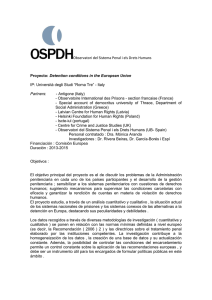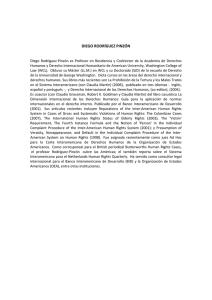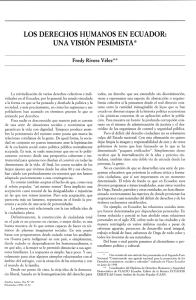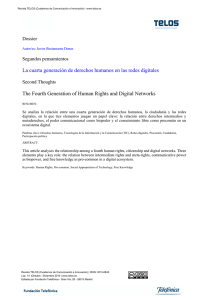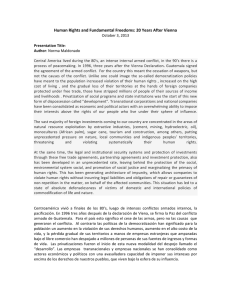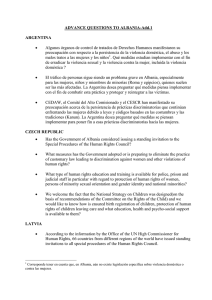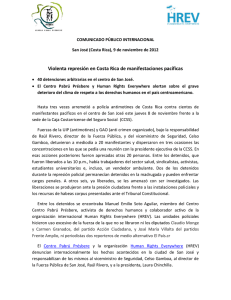Interview: José de Jesús Orozco-Henríquez, Commissioner at the
Anuncio
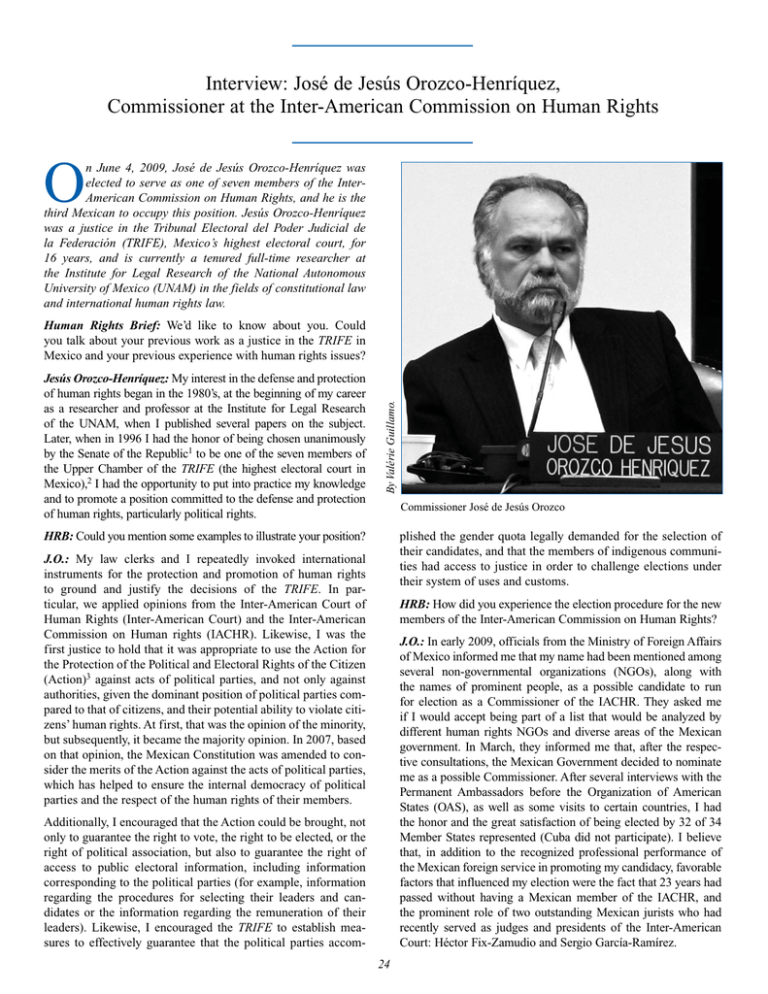
Interview: José de Jesús Orozco-Henríquez, Commissioner at the Inter-American Commission on Human Rights O n June 4, 2009, José de Jesús Orozco-Henríquez was elected to serve as one of seven members of the InterAmerican Commission on Human Rights, and he is the third Mexican to occupy this position. Jesús Orozco-Henríquez was a justice in the Tribunal Electoral del Poder Judicial de la Federación (TRIFE), Mexico’s highest electoral court, for 16 years, and is currently a tenured full-time researcher at the Institute for Legal Research of the National Autonomous University of Mexico (UNAM) in the fields of constitutional law and international human rights law. Jesús Orozco-Henríquez: My interest in the defense and protection of human rights began in the 1980’s, at the beginning of my career as a researcher and professor at the Institute for Legal Research of the UNAM, when I published several papers on the subject. Later, when in 1996 I had the honor of being chosen unanimously by the Senate of the Republic1 to be one of the seven members of the Upper Chamber of the TRIFE (the highest electoral court in Mexico),2 I had the opportunity to put into practice my knowledge and to promote a position committed to the defense and protection of human rights, particularly political rights. By Valérie Guillamo. Human Rights Brief: We’d like to know about you. Could you talk about your previous work as a justice in the TRIFE in Mexico and your previous experience with human rights issues? Commissioner José de Jesús Orozco plished the gender quota legally demanded for the selection of their candidates, and that the members of indigenous communities had access to justice in order to challenge elections under their system of uses and customs. HRB: Could you mention some examples to illustrate your position? J.O.: My law clerks and I repeatedly invoked international instruments for the protection and promotion of human rights to ground and justify the decisions of the TRIFE. In particular, we applied opinions from the Inter-American Court of Human Rights (Inter-American Court) and the Inter-American Commission on Human rights (IACHR). Likewise, I was the first justice to hold that it was appropriate to use the Action for the Protection of the Political and Electoral Rights of the Citizen (Action)3 against acts of political parties, and not only against authorities, given the dominant position of political parties compared to that of citizens, and their potential ability to violate citizens’ human rights. At first, that was the opinion of the minority, but subsequently, it became the majority opinion. In 2007, based on that opinion, the Mexican Constitution was amended to consider the merits of the Action against the acts of political parties, which has helped to ensure the internal democracy of political parties and the respect of the human rights of their members. HRB: How did you experience the election procedure for the new members of the Inter-American Commission on Human Rights? J.O.: In early 2009, officials from the Ministry of Foreign Affairs of Mexico informed me that my name had been mentioned among several non-governmental organizations (NGOs), along with the names of prominent people, as a possible candidate to run for election as a Commissioner of the IACHR. They asked me if I would accept being part of a list that would be analyzed by different human rights NGOs and diverse areas of the Mexican government. In March, they informed me that, after the respective consultations, the Mexican Government decided to nominate me as a possible Commissioner. After several interviews with the Permanent Ambassadors before the Organization of American States (OAS), as well as some visits to certain countries, I had the honor and the great satisfaction of being elected by 32 of 34 Member States represented (Cuba did not participate). I believe that, in addition to the recognized professional performance of the Mexican foreign service in promoting my candidacy, favorable factors that influenced my election were the fact that 23 years had passed without having a Mexican member of the IACHR, and the prominent role of two outstanding Mexican jurists who had recently served as judges and presidents of the Inter-American Court: Héctor Fix-Zamudio and Sergio García-Ramírez. Additionally, I encouraged that the Action could be brought, not only to guarantee the right to vote, the right to be elected, or the right of political association, but also to guarantee the right of access to public electoral information, including information corresponding to the political parties (for example, information regarding the procedures for selecting their leaders and candidates or the information regarding the remuneration of their leaders). Likewise, I encouraged the TRIFE to establish measures to effectively guarantee that the political parties accom24 Entrevista: José de Jesús Orozco-Henríquez, Comisionado en la Comisión Interamericana de Derechos Humanos J osé de Jesús Orozco-Henríquez fue elegido el 4 de junio para fungir como uno de los siete miembros de la Comisión Interamericana de Derechos Humanos, y es el tercer mexicano en ocupar dicho cargo. Jesús Orozco Henríquez fue magistrado del Tribunal Electoral del Poder Judicial de la Federación (TRIFE) durante 16 años y actualmente es investigador titular de tiempo completo en el Instituto de Investigaciones Jurídicas de la Universidad Nacional Autónoma de México (UNAM) en las áreas de Derecho Constitucional y Derechos Humanos. correspondiente a los partidos políticos (por ejemplo, para conocer los procedimientos de selección de sus dirigentes y candidatos o la remuneración de sus dirigentes). Igualmente, impulsé que el TRIFE estableciera medidas para garantizar de manera efectiva que los partidos políticos satisficieran la cuota de género exigida por la ley para seleccionar a sus candidatos, y que los miembros de comunidades indígenas tuvieran acceso a la justicia para impugnar elecciones bajo el sistema de usos y costumbres indígenas. Human Rights Brief: Quisimos saber mas de usted. ¿Podría hablar usted de su trabajo anterior como un Juez del TRIFE en México y de su experiencia en asuntos con respecto a derechos humanos? HRB: ¿Cómo era su experiencia del procedimiento de elección para los nuevos miembros de la Comisión Interamericana de Derechos Humanos? J.O.: Al inicio del 2009, funcionarios de la Secretaría de Relaciones Exteriores de México me comentaron que mi nombre había sido mencionado entre diversas ONGs, junto con él de destacadas personas, como posible candidato para postularse como Comisionado en la CIDH. Me consultaron si aceptaba formar parte de una lista que sería analizada por diversas organizaciones no gubernamentales defensoras de derechos humanos y diversas áreas del gobierno. En el mes de marzo, me informaron que, después de las consultas respectivas, el Gobierno Mexicano había decidido proponerme como Comisionado. Después de diversas entrevistas con los respectivos Embajadores ante la Organización de Estados Americanos (OEA), así como algunas visitas a ciertos países, tuve el honor y la gran satisfacción de ser electo y contar con el voto de 32 de los 34 países representados (Cuba no participó). Estimo que, además del reconocido profesionalismo del servicio exterior mexicano al promover mi candidatura, factores que influyeron favorablemente en mi elección fueron el hecho de haber transcurrido más de 23 años sin que un mexicano fuera miembro de la CIDH, así como el destacado papel que recientemente habían desempeñado dos ilustres juristas mexicanos como jueces y presidentes de la Corte IDH, como son Héctor Fix-Zamudio y Sergio García-Ramírez. Jesús Orozco-Henríquez: Mi interés por la defensa y protección de los derechos humanos nace en la década de los 80’s, al inicio de mi carrera como investigador y profesor del Instituto de Investigaciones Jurídicas de la UNAM, y al publicar diversos trabajos sobre la materia. Posteriormente, cuando en 1996 tuve el honor de ser elegido unánimemente por el Senado de la República para ser uno de los siete miembros de la Sala Superior del TRIFE (la máxima autoridad jurisdiccional electoral en México), tuve oportunidad de poner en la práctica mis conocimientos e impulsar una posición comprometida con la defensa y protección de los derechos humanos, particularmente los derechos políticos. HRB: ¿Podría mencionar usted algunos ejemplos para ilustrar su posición? J.O.: En mi ponencia recurrentemente invocamos instrumentos internacionales de protección y promoción de los derechos humanos para fundar y motivar las sentencias del TRIFE. En particular, aplicamos criterios de la Corte Interamericana de Derechos Humanos (Corte IDH) y de la Comisión Interamericana de Derechos Humanos (CIDH). Asimismo, fui el primer magistrado en sostener que era procedente el juicio para la protección de los derechos político-electorales del ciudadano (el Juicio) contra actos de partidos políticos -y no sólo de autoridades-, dada la posición preponderante de los partidos políticos frente a la de los ciudadanos y su aptitud potencial para violar los derechos humanos de éstos. Al principio, el criterio fue minoritario, pero, con posterioridad, el criterio se convirtió en el mayoritario. En 2007, con base en dicho criterio, se reformó la Constitución mexicana para contemplar la procedencia del Juicio contra actos de partidos políticos, lo cual ha contribuido a garantizar la democracia interna de los partidos políticos y el respeto a los derechos humanos de sus afiliados. Deseo mencionar que me siento muy afortunado de trabajar con excelentes colegas en la CIDH, tanto por su reconocido compromiso con la causa de los derechos humanos como por sus altas cualidades personales y profesionales. La comunicación entre nosotros es franca y fluida. Creo que una ventaja de la actual conformación en la CIDH es que provenimos de diversos ámbitos y disciplinas (como el jurisdiccional, el diplomático, la defensa no gubernamental de los derechos humanos, así como el académico, incluyendo perspectivas tanto del derecho internacional como del derecho constitucional), lo cual resulta muy enriquecedor para nuestro trabajo. Además, impulsé que el Juicio no sólo procediera para garantizar los derechos políticos de votar, ser votado y de asociación político-electoral, sino también para garantizar el derecho de acceso a la información político-electoral, incluso información HRB: ¿Como miembro de la Comisión, podría decirnos usted los desafíos más grandes que enfrentará el sistema Interamericana de Derechos Human en los próximos cuatro años? 25 It is necessary to boost the cooperation and promotion functions of the IACHR, strengthening the explanations of our decisions, and engage more actively in the friendly settlement process at any stage of the proceeding. I want to mention that I feel very fortunate to work with excellent colleagues at the IACHR, as much because of their recognized commitment to the cause of human rights as their extraordinary personal and professional qualities. Communication between us is frank and fluid. I believe that an advantage of the current composition of the IACHR is that we come from diverse areas and disciplines (like the judiciary, diplomacy, the civil society defense of human rights, as well as academia, including perspectives from both international law and constitutional law), which is very enriching for our work. Court respectively (currently only two States Parties to the American Convention on Human Rights have established a mechanism for implementation, and one more has partially done so). With regard to the IACHR, each year the number of petitions has increased, not because human rights violations have increased in the region but because the people of the Americas increasingly view the System as a mechanism for justice. However, limitations remain in the budget allocated by the OAS, which has resulted in a significant backlog. In effect, former compositions of the IACHR have been taking measures to reduce the backlog and it is clear that we should review our procedures once again to speed them up and propose new solutions to address the problems with a shoestring budget. In any case, it would be convenient for the necessary and highly appreciated support of external donors to have a multi-year character in order to establish plans and programs in the medium and long term. HRB: As a Commissioner, could you tell us the greatest challenges you see that the Inter-American Human Rights System will face during the next four years? J.O.: It is important to encourage all states of the Americas to ratify each of the Inter-American instruments for the protection of human rights, as well as the recognition of the jurisdiction of the Inter-American Court. Also, one of the greatest challenges today is to articulate the Inter-American System for the Promotion and Protection of Human Rights (System) with the active and effective participation of all constituent parts. That means not only visualizing the System as the IACHR and the Inter-American Court, but to encourage States, civil society organizations and especially the ombudsman and other constitutional or local organisms for the defense of human rights to assume an authentic role as guarantors and public policy advocates for human rights under international standards. Along these lines, it is necessary to boost the cooperation and promotion functions of the IACHR, strengthening the explanations of our decisions, and engage more actively in the friendly settlement process at any stage of the proceeding. As head of the Human Rights Defenders Unit of the IACHR, not only will I place emphasis on ensuring effective protection of the defenders’ rights, but I will promote greater participation of public and private human rights defenders within the System. It is clear that their role is strategic for generating a culture of respect for human rights in the region based on human dignity, as well as ensuring their effective protection. It is relevant to encourage the recognition of the constitutional hierarchy of the human rights treaties by States that are part of the American Convention on Human Rights (only eleven States have created that hierarchy); the knowledge and recurrent use of the InterAmerican standards for the promotion and protection of human rights by the highest national courts of the OAS Member States; as well as the adoption of legislation that effectively implements the recommendations and decisions of the IACHR and Inter-American Santiago Vázquez-Camacho, an LL.M. candidate in the International Legal Studies Program at the American University Washington College of Law, and Consulting Attorney of the Rapporteurship on the Rights of the Child of the Inter-American Commission on Human Rights, and Charles Abbott, Senior Online Editor of the Human Rights Brief, collaborated in this interview for the Human Rights Brief. HRB Endnotes: Interview: José De Jesús Orozco-Henríquez, Commissioner at the Inter-American Commission on Human Rights 1 Court ordered Mexico to complete, within a reasonable time, the adaptation of its domestic law to the American Convention on Human Rights, so that, using this remedy, the citizens are effectively guaranteed the possibility of contesting the constitutionality of the legal regulation of the right to be elected. I/A Court H.R., Case of Casta Òeda-Gutman v. Mexico. Preliminary Objections, Merits, Reparations, and Costs. Judgment of August 6, 2008. Series C No. 184, para. 231. 4 The decisions can be consulted in the internet page of the TRIFE (www.trife.gob.mx). The justices from the TRIFE are elected by two thirds of the present members of the Senate from a proposal of the Supreme Court of Justice. 2 The TRIFE is competent to qualify the presidential elections and to decide definitively disputes related to any federal or state elections. 3 The Action for the Protection of the Political and Electoral Rights of the Citizen is a judicial mechanism regulated in the Constitution and general laws for protecting the citizens from laws and acts from electoral authorities and acts from political parties that in a particular case allegedly violated the political rights of a citizen. In 2008 the Inter-American 26 Es necesario impulsar las funciones de promoción y cooperación de la CIDH, fortalecer la motivación de nuestras decisiones, e involucrarnos de manera más activa en los procesos de solución amistosa en cualquier etapa del procedimiento. visualizan cada vez más al Sistema como un mecanismo de justicia. Sin embargo, persisten las limitaciones en el presupuesto asignado por la OEA, lo cual ha propiciado un rezago significativo. Al efecto, anteriores integraciones de la CIDH han estado adoptando medidas para abatir el rezago y es claro que debemos revisar, una vez más, nuestros procedimientos a fin de intentar agilizarlos y plantear nuevas soluciones para hacer frente a una problemática con un presupuesto siempre exiguo. En todo caso, convendría que el necesario y muy apreciado apoyo de donantes externos pudiera tener un carácter multianual que permita establecer planes y programas a mediano y largo plazo. J.O.: Es importante promover que todos los Estados de las Américas ratifiquen cada uno de los instrumentos interamericanos de protección de los derechos humanos, así como que reconozcan la jurisdicción de la Corte IDH. Asimismo, uno de los mayores retos actuales es articular el Sistema Interamericano de Promoción y Protección de los Derechos Humanos (el Sistema) con la participación activa y eficaz de todas las partes que lo integran. Ello implica no sólo visualizar al Sistema como la CIDH y la Corte IDH, sino promover que los Estados, las organizaciones de la sociedad civil y especialmente los ombudsman y demás organismos constitucionales o locales de defensa de los derechos humanos asuman un papel auténticamente garante y promotor de políticas públicas a favor de los derechos humanos bajo estándares internacionales. Asimismo, es necesario impulsar las funciones de promoción y cooperación de la CIDH, fortalecer la motivación de nuestras decisiones, e involucrarnos de manera más activa en los procesos de solución amistosa en cualquier etapa del procedimiento. Es relevante impulsar el reconocimiento de la jerarquía constitucional de los tratados de derechos humanos en todos los Estados parte de la Convención Americana sobre los Derechos Humanos (en la actualidad sólo 11 países le han dado esa jerarquía); el conocimiento y uso recurrente de los estándares interamericanos de promoción y protección de los derechos humanos por parte de los máximos tribunales de los Estados miembros de la OEA; así como la adopción de legislación interna que implemente las recomendaciones y sentencias de la CIDH y Corte IDH respectivamente (en la actualidad sólo 2 Estados partes de la Convención Americana sobre los Derechos Humanos han establecido un mecanismo de implementación y uno más de forma parcial). Como encargado de la Unidad de Defensoras y Defensores de Derechos Humanos en la CIDH, no sólo pondré énfasis en velar por la protección efectiva de sus respectivos derechos, sino que promoveré una mayor participación de las defensorías de los derechos humanos públicas y privadas dentro del Sistema. Es claro que su función es estratégica para generar una cultura de respeto de los derechos humanos en la región con base en la dignidad humana, así como para garantizar su tutela efectiva. Santiago Vázquez-Camacho, estudiante de la Maestría (LL.M.) en Derecho Internacional (International Legal Studies Program) de American University Washington College of Law y abogado consultor de la Relatoría sobre los Derechos de la Niñez de la Comisión Interamericana de Derechos Humanos, y Charles Abbott, Senior Online Editor del Human Rights Brief, colaboraron en esta entrevista para el Human Rights Brief. HRB Respecto a la CIDH, cada año ha incrementado el número de peticiones, no porque hayan aumentado las violaciones a los derechos humanos en la región sino porque las y los americanos Endnotes: Entrevista: José de Jesús Orozco-Henríquez, Comisionado en la Comisión Interamericana de Derechos Humanos 1 políticos de algún ciudadano. En el 2008, la Corte Interamericana de Derechos Humanos ordenó a México completar, en un tiempo razonable, la adaptación de su legislación interna a la Convención Americana sobre Derechos Humanos, “de manera que mediante dicho recurso se garantice a los ciudadanos de forma efectiva el cuestionamiento de la constitucionalidad de la regulación legal del derecho a ser elegido”. Corte IDH. Caso Castañeda Gutman Vs. México.Excepciones Preliminares, Fondo, Reparaciones y Costas. Sentencia de 6 de agosto de 2008. Serie C No. 184, párr. 231. 4 Las sentencias pueden consultarse en la página del TRIFE (www.trife.gob.mx). Los magistrados del TRIFE son elegidos por las dos terceras partes de los miembros presentes de la Cámara de Senadores a propuesta de la Suprema Corte de Justicia de la Nación. 2 El TRIFE es competente para calificar la elección presidencial y resolver definitivamente impugnaciones de cualquier elección federal o local. 3 El Juicio para la Protección de los Derechos Políticos y Electorales del Ciudadano es un mecanismo judicial regulado en la Constitución y en leyes generales para proteger a los ciudadanos de leyes y actos de autoridades electorales y actos de partidos políticos que en un caso concreto presuntamente hayan violado los derechos 27
